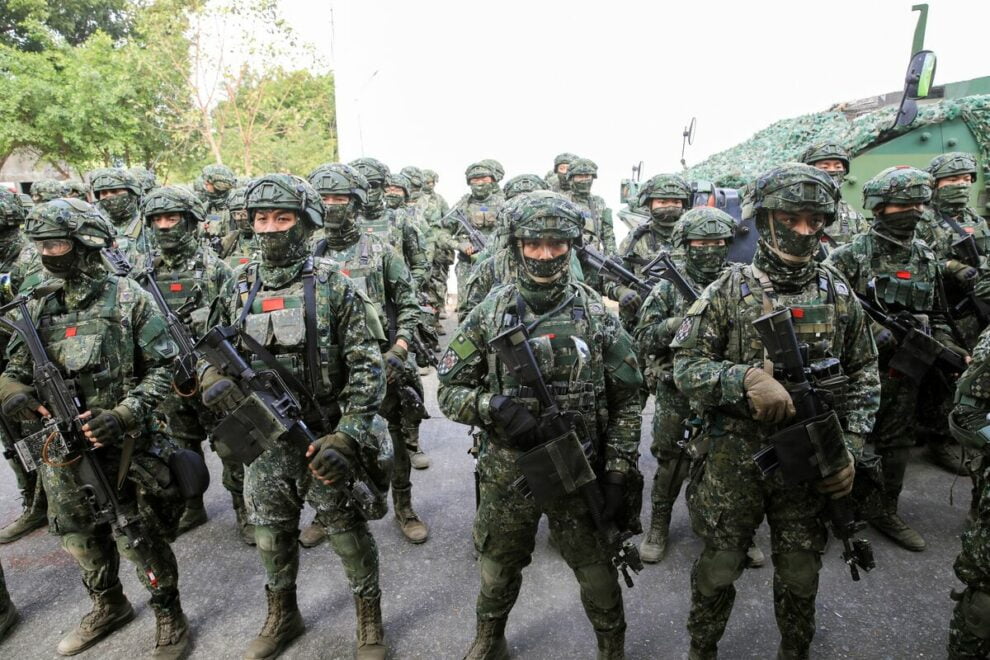If there is a war with China over Taiwan, America’s regional allies aren’t likely to join the U.S. in fighting it.
While it is often assumed in Washington that it could count on at least some of its treaty allies to support and join American forces, this is based on best-case scenarios and wishful thinking. Even the most reliable treaty allies, including Japan and Australia, would be reluctant to join what would be a very costly U.S. war effort.
In the absence of allied support, the already daunting challenge of defending Taiwan would become even more difficult.
The Wall Street Journal reported over the weekend on Japan’s lack of commitment to involve itself directly in the defense of Taiwan. According to the report, the Japanese government might give permission to let the U.S. use bases in Japan, but its own participation is unlikely: “Japanese leaders publicly shun discussion of a role in any Taiwan war, in part because public opinion is generally against getting ensnared in a conflict.”
While the Japanese government has been increasing its military spending, it is doing that for the sake of its own defense and not so that it can take part in a major war. As Kiyoshi Sugawa wrote for Responsible Statecraft in May, “The United States should not take it for granted that Japan will simply go along with Washington’s desires or expectations.”
This reluctance is influenced by Japanese public opinion. As an analysis for Voice of America noted last year, Japanese involvement in a Taiwan conflict is “far from certain and not popularly supported within Japan.” According to a poll this spring conducted for The Asahi Shimbun, just 11 percent of Japanese respondents said that their armed forces should join the U.S. in the fighting, and 27 percent said that their forces should not work with the U.S. military at all.
Most people in Japan (56 percent) favor only a logistical supporting role for Japan in the event of war over Taiwan. Any Japanese government that joined the war would have very little support from their voters.
Australia is also unlikely to join the U.S. in a war. The Australian government has been clear that it made no promises to the U.S. that it would take part in a conflict over Taiwan in exchange for the provision of nuclear-powered submarines under the AUKUS arrangement. Even though Australia has a record of fighting in every major U.S. war since WWII, a war over Taiwan is almost certainly a bridge too far. If an ally as stalwart as Australia wouldn’t take part, it is hard to imagine that any other allies would.
We have already seen earlier this year that the Philippine government has ruled out letting the U.S. use bases on its territory to support U.S. operations in a war over Taiwan. The base access that the U.S. has secured under the Enhanced Defense Cooperation Agreement does not entitle U.S. forces to stockpile weapons for such a conflict, and they will not be allowed to engage in rearming, refueling, or repairs, either.
President Ferdinand Marcos, Jr. has said several times that his government has agreed to the base access to improve security for his country and not for any other purposes.
South Korea likewise has strong incentives to stay out of a Taiwan conflict. Seoul not only has a larger and more immediate threat to worry about in North Korea, but it also cannot afford hostility with China. Like the other allies, South Korea has a huge trade relationship with China that would be wrecked if it joined in a U.S. military campaign.
The remaining U.S. regional treaty ally, Thailand, is even less inclined to have anything to do with such a conflict. Thailand would not be able to do much of anything to assist the U.S. in this war even if it wanted to, and it wouldn’t want to. As Zachary Abuza of the Naval War College has explained, “Thailand does not view China as a revisionist power or a military threat.”
Since 1945, when the U.S. has gone to war it has usually done so with at least some major allies on its side. The involvement of major allies has been useful in terms of providing additional forces for the mission, and it has also lent the effort the appearance of broader international support. A war over Taiwan would be very likely different. The U.S. cannot count on significant military assistance from any of its longstanding allies in the Asia-Pacific region in this scenario, and allies in other parts of the world that might express support for the U.S. would not have the means to assist.
If the U.S. did manage to cajole one or two of its treaty allies into joining the war, it would probably come at the price of doing significant harm to its relationships with these states over the longer term.
The allies’ reluctance to take part in a major war that they are not obliged to fight is understandable. All of them stand to lose a great deal if they took up arms against China, and they have no compelling reason to join such a conflict. The alliances they have with the United States exist to provide for their defense against attack on their own countries. They are not meant to be and will not serve as justifications to drag these states into just any war that the U.S. chooses to fight.
If U.S. allies that are in the region are unwilling to fight in a Taiwan conflict, it raises obvious questions about why the U.S. should be willing.
Many China hawks claim that maintaining U.S. alliances in East Asia is one of the reasons why the U.S. must defend Taiwan, but the unwillingness of those same allies to take part in the fight gives us reason to doubt that. The hawkish assumption is that allies will lose faith in American commitments if the U.S. doesn’t fight for Taiwan, but this seems to be based on nothing but the hawks’ own mistaken understanding of how credibility works.
The reality is that U.S. treaty allies don’t believe that Taiwan is worth fighting for, and they aren’t going to penalize the U.S. if it chooses not to intervene.
If the U.S. can’t expect its treaty allies to assist in a war over Taiwan, that makes it crucial that the U.S. does what it can to maintain a peaceful status quo. To that end, the U.S. needs to do a better job of reassuring the Chinese government that it does not seek to overturn the status quo. Without that credible reassurance, the U.S. and China are on a path of arms racing and worsening tensions.
Allied reluctance to get involved in a war over Taiwan should give U.S. policymakers pause and make the U.S. much more cautious about committing to a major war.
Source : Responsible Statecraft
















